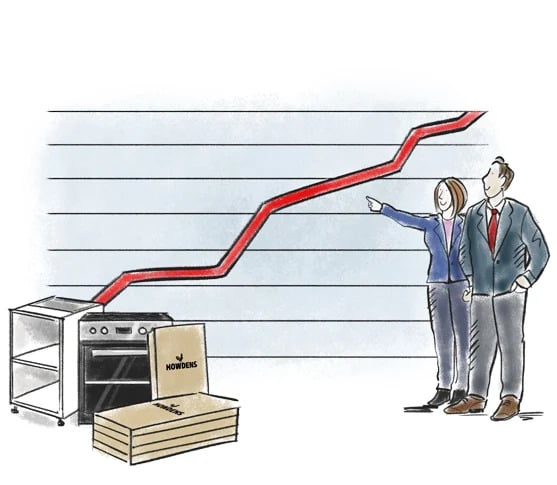Division of Responsibilities
THE BOARD'S ROLE
The role of the Board is to direct the affairs of the Group so that long-term, sustainable performance may be achieved which meet stakeholder and shareholder interests.
The Directors are collectively responsible for developing the strategy of the Group and ensuring there are sufficient resources to successfully implement that strategy. They should challenge the performance and decisions of the senior management team and provide counsel to the senior management team in their day-to-day running of the business. They are also responsible for setting and protecting the culture and values of the business – a role particularly pertinent to Howdens where integrity, respect, individual accountability and recognition are fundamental tenets of the business.
Matters which are reserved for consideration by the Board and are not delegated to a Board Committee or to the Executive Committee, are detailed in a Schedule of Matters Reserved for the Board (the “Schedule”), which is reviewed annually. These matters include setting the Group's values, standards and strategy as well as taking decisions about:
- acquisitions and disposals
- risk management
- internal control
- significant capital projects
- annual budgets
- Group borrowing facilities
- significant financial and operational matters
The Board also considers legislative, environmental, health & safety, governance and employment issues.
The Chair is primarily responsible for the leadership and effectiveness of the Board and for creating a culture of openness, debate and challenge in the boardroom. He is also responsible for ensuring effective communication with our shareholders.
The Chair is responsible for setting the Board's agenda (with support from the Company Secretary) and ensuring that adequate time is given to discussion of all agenda items at meetings.
Non-Executive Directors have the same general legal responsibilities to the Company and the same commitment to its success as the Executive Directors. However, the Non-Executive Directors are removed from the day-to-day management of the Company and so are able to provide independent judgement and oversight, and to constructively challenge senior management.
Non-Executive Directors are also key to providing the business with valuable insights, specialist knowledge and creative solutions gained from experience outside the Company. Our Non-Executive Directors, therefore, have been selected for the diversity of their backgrounds, perspectives, experience and personal attributes, as well as for their impressive business acumen.
As well as their general legal responsibilities as Directors of the Company, the Chief Executive Officer and the Chief Financial Officer have been delegated the day-to-day running of the Group by the Board and are responsible for satisfactory execution of the policies and strategy agreed by the Board.
The Company Secretary is an officer of the Company and shares various legal obligations with the Directors. He provides the Board with guidance and advice on various governance and regulatory matters (under the direction of the Chair) and ensures that information flows effectively and in a timely manner between the Board and senior management, as well as within the Board and between the Board's Committees.
The Company Secretary is also responsible for developing and overseeing the systems which ensure compliance with various legal and code requirements and for supervising the day-to-day administration of the Company.
External advisors provide a range of services to the Board and its Committees including banking, brokerage, legal, audit, actuarial, financial PR and Executive remuneration, as well as other consulting services. Both the Executive Committee and the Board rely on such advisors to provide counsel and guidance on specialist matters when necessary. The Non-Executive Directors can engage with advisors at the Company's expense, independent of management where appropriate.
The competency, value, length of tenure and independence of advisors is reviewed by the Board on an annual basis.
DIVISION OF RESPONSIBILITIES
The roles of Chair and Chief Executive Officer (CEO) are held by separate members of the Board and are clearly defined. This provides a crucial safeguard so that no one person has unlimited decision-making power and that no one person is responsible for monitoring their own performance. The Senior Independent Director (SID) role also ensures that issues may be raised in the event a principal shareholder feels unable to raise them with the Chair directly and ensures that there is an alternative communication channel between the Chair and the Board.
HOWDENS Making space more valuable

Business Model and Strategy

Depots

Sustainability
Community

Products
People and Careers

